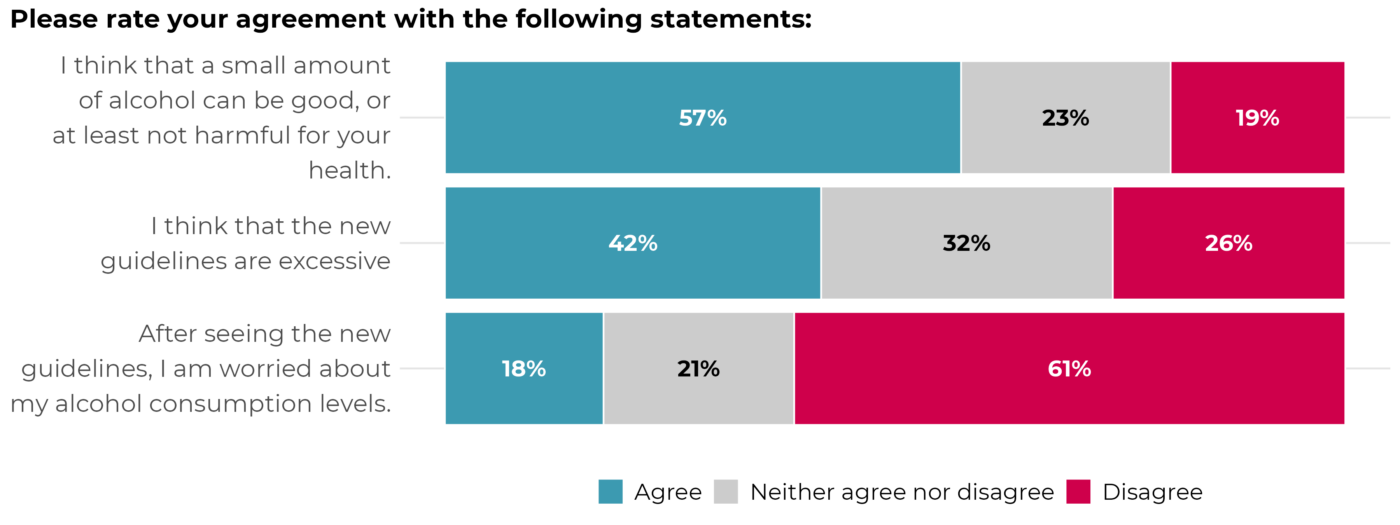New alcohol and health guidelines: how willing are Canadians to change their habits
May 23, 2023
This blog provides information on recent findings as part of our Greyhound research project.
For the first time in 12 years, the Canadian Centre on Substance Use and Addiction (CCSA) released new alcohol guidelines on January 17th, 2023. The new recommendations are a stark departure from the previous ones: while the former guidelines suggested that the maximum weekly alcohol intake should be of 10 drinks for women and of 15 drinks for men, the new rules recommend no more than 2 alcohol drinks per week in order to limit risks to one’s health. Further, while some might have previously thought that small amounts of alcohol were harmless or even beneficial at times, the CCSA now states that any quantity or type of alcohol is harmful for one’s health.
The new guidelines made headlines in Canada and abroad, generating a public debate about what this meant for people’s relationships with drinking, social habits and perceptions of risk associated with it. In light of these new guidelines, DS conducted an online survey among Canadians in March to understand their perceptions of these new rules and their intent to follow them in the future. Will Canadians really limit themselves to two weekly alcohol drinks?
First, we found that a majority of Canadians (71%) had heard about these guidelines, confirming the widespread awareness linked to these guidelines. Moreover, respondents who had heard about this CCSA release were generally knowledgeable about its content: a majority of those aware correctly recalled that the guidelines specified that every extra drink consumed adds risk (58%). Also, 48% remembered that the recommendations specify a weekly limit to maintain low risks (2 drinks per week), and 38% identified that the rules mentioned cancer risks associated with alcohol consumption. In general, few respondents who had heard about the guidelines misunderstood its content: only 14% incorrectly thought that the guidelines specified that 1-2 drinks pose no cancer risk, while 9% said the rules were that wine is less harmful than spirits, another false statement introduced to test assumptions. These results show that not only were Canadians aware that there were new guidelines for alcohol consumption, they generally knew the details and implications of these guidelines.
Canadians know rules have changed — but will they themselves change?
Currently, Canadians self-reported drinking behaviour lies outside of the new recommendations, and tends to be situated more in the “moderate risk” range. Most Canadians say they drink at least occasionally (62%), and 59% say they drink at least once a week, while a third of our sample says they never drink alcohol. Only 4% of respondents report drinking more in an average week than what the CCSA recommended in its older guidelines. In more detail, on average, women report consuming about 4 drinks per week while men report drinking 6. Men under 35 report the highest drinking average, with almost 7 beverages a week. However, research has shown that individuals tend to underreport their own alcohol consumption, especially when measured in terms of “standard weekly drinks”, and that the more you drink, the more you may underestimate how much you drink. This suggests that Canadians’ behaviour might be a bit farther from the new recommendations than what they are willing to admit, and that following the new guidelines might mean drastic changes for many in Canada, at least in the short term.
About a quarter (23%) of respondents who drink were already thinking that they drank too much before seeing the guidelines. Specifically, respondents under 35 and between 50 and 64 were most likely to think their alcohol consumption was too high prior to seeing the new guidelines.

This means that the vast majority of Canadians who consume alcohol were not thinking twice about their own alcohol consumption prior to seeing the new rules. Furthermore, as we discuss below, our data suggests that the new guidelines, while widely shared and discussed among Canadians, have not really sparked Canadians to rethink and reduce their alcohol consumption.

In general, for now, most Canadians say they are not concerned for their health or willing to comply with the new recommendations:
- Only 18% of respondents who drink alcohol say that they are now worried about their alcohol consumption after seeing the new recommendations. Respondents under 35 are slightly more worried than average (28% are worried) while those between 50 and 64 years old are slightly less worried (16%) than them in comparison.
- About a third of Canadians who drink say they intend to reduce their consumption after seeing the guidelines. Women say they are slightly more willing than men to drink less in light of the new guidelines (36% vs 31% agree with the statement). Canadians under 50 years old are also more willing to reduce their alcohol consumption in light of the new guidelines.

While a few respondents are worried and intend to change, we find that Canadians align more on a certain degree of skepticism towards the new guidelines: more than 40% of respondents think the guidelines are excessive. This is especially common among men: half of men agree that the new rules are excessive, compared to only 35% of women.
Further, a majority of Canadians (57%) still believe that a small amount of alcohol can either be good or not harmful to their health, contrary to the new CCSA insights. Canadians over 50 years old are especially convinced of this: 64% agree. Respondents under 35 years old are slightly less likely to agree with this statement, which suggests there might be a generational shift in attitudes about alcohol consumption.
In conclusion, our data shows that Canadians have heard and read about the new CCSA guidelines, but have not taken these recommendations very seriously yet and that most do not intend to drink less to comply with the new recommendations so far. Canadians under 50 may be slightly more willing to adapt to the new guidelines, as they report higher levels of worry towards their own drinking habits, higher willingness to reduce their alcohol consumption, and are slightly less likely to minimize the validity of the new guidelines. While some younger Canadians may change their behaviour, so far it seems unlikely that the new CCSA guidelines would dramatically impact drinking rates in Canada and that while widely discussed, these new guidelines aren’t very convincing for most.


